Gandhi Blu-ray Movie
HomeGandhi Blu-ray Movie 
Sony Pictures | 1982 | 191 min | Rated PG | Feb 17, 2009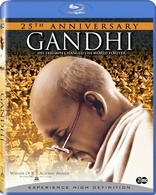
Movie rating
7.9 | / 10 |
Blu-ray rating
| Users | 4.8 | |
| Reviewer | 4.0 | |
| Overall | 4.6 |
Overview
Gandhi (1982)
This acclaimed biographical drama presents major events in the life of Mohandas Gandhi (Ben Kingsley), the beloved Indian leader who stood against British rule over his country. Dedicated to the concept of nonviolent resistance, Gandhi is initially dismissed by English officials, including the influential Lord Irwin (John Gielgud), but eventually he and his cause become internationally renowned, and his gatherings of passive protest move India towards independence.
Starring: Ben Kingsley, Candice Bergen, Edward Fox, John Gielgud, Trevor HowardDirector: Richard Attenborough
| Drama | Uncertain |
| History | Uncertain |
| Period | Uncertain |
| Epic | Uncertain |
| Biography | Uncertain |
Specifications
Video
Video codec: MPEG-4 AVC
Video resolution: 1080p
Aspect ratio: 2.35:1
Original aspect ratio: 2.39:1
Audio
English: Dolby TrueHD 5.1 (48kHz, 16-bit)
French: Dolby TrueHD 5.1
Portuguese: Dolby Digital 5.1
Spanish: Dolby Digital 5.1
Subtitles
English, English SDH, French, Portuguese, Spanish, Arabic, Dutch
Discs
50GB Blu-ray Disc
Two-disc set (2 BDs)
Bonus View (PiP)
Playback
Region free
Review
Rating summary
| Movie | 5.0 | |
| Video | 3.5 | |
| Audio | 3.5 | |
| Extras | 4.0 | |
| Overall | 4.0 |
Gandhi Blu-ray Movie Review
Sony delivers a solid 1080p treatment to the Ben Kingsley classic in honor of its 25th anniversary.
Reviewed by Greg Maltz February 9, 2009I recall walking out of the theater after watching Gandhi in 1982 and overhearing a boy in the parking lot promise his parents he would never fight with his sister again. It is one small testament to the power of film and the profound influence of Mohandas Gandhi's philosophy of nonviolence. The larger examples include India's independence and leadership, the shrinking legacy of colonialism and racism and the many disciples of Gandhi, such as Martin Luther King, Jr. Gandhi's beliefs resonated with the people of India and beyond. He focused on teachings of peace and selflessness common to all religions in an attempt to knock down the walls between the powerless and powerful. He spent most of his life trying to unite Hindu, Sikh and Muslim elements of India to bring about a peaceful end to British rule and a united country. In the film, Richard Attenborough attempted to cover Gandhi's adult life in broad strokes. The epic nature of the story lends itself to Attenborough's big production, which won nine academy awards including Best Picture. While not reference quality, the 25th Anniversary Blu-ray edition of Gandhi provides significantly better picture and sound quality than the 2001 DVD release.
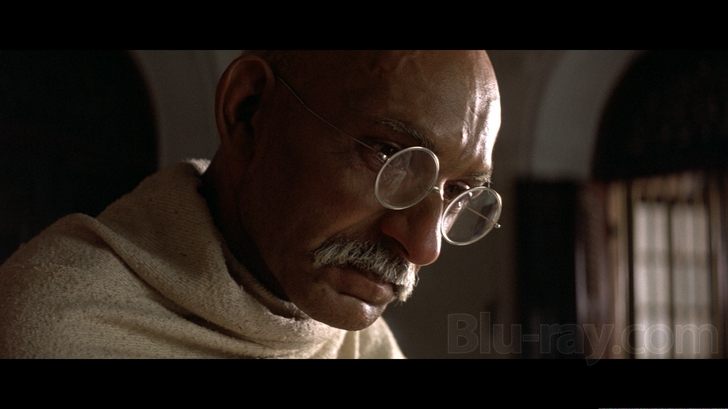
In his defining performance, Ben Kingsley helped a new generation connect with Gandhi.
After opening with a disturbing dramatization of Gandhi's assassination, the film begins with his early attempt to fight discrimination and apartheid law in South Africa. Trained as a lawyer, Gandhi had a unique view of laws and society that informed his decisions and actions. After South Africa, Attenborough traces Gandhi's rediscovery of India and his rise as a spokesman and leader. The narrative focuses on the nonviolence and inclusive social outreach that became Gandhi's strongest tools, as well as his imprisonment and hunger strikes that indeed led to more progress than violence against British rule. Throughout the film, Sir Ben Kingsley delivers a gripping character study, conveying the seriousness of the narrative while showing Gandhi's rare combination of frailty and fierce determination, humanity and humility, spirituality and politics. Kingsley won Best Actor at the 1982 Academy Awards for his performance. At the beginning of the film, Attenborough, who won Best Director, cites Albert Einstein's apropos quote about the Mahatma (great soul): "Generations to come will scarce believe that such a one as this ever in flesh and blood walked upon this earth." Indeed, Gandhi's selflessness and unflinching principles made him larger than life. The film helps to show why.
Although Gandhi arrived in theaters in 1982, the idea for the movie first took shape in 1962 during Attenborough's phone conversation with Motilal kothari of the Indian High Commission in London. Kothari was obsessed with finding a producer to bring Gandhi's life to the silver screen. Resolving not just to produce the film but also direct it, Attenborough formed a circle of British film personalities, with resolve to do justice to the project. The scope of the movie required 18 years of negotiations with studio heads, film distributors and leaders in India before Attenborough secured the $22 million required for the project, and began filming in 1980. Production designer Stuart Craig, who earned Gandhi more Oscars for Best Art Direction and Best Set Decoration, used 87 settings for the 189 scenes in the script by John Briley (who also struck Oscar gold). The most ambitious set was the Sabarmati ashram commune, built on several acres alongside the Jumna river. After more marathon sessions throughout India and in England, the film was completed on May 10, 1981.
Gandhi Blu-ray Movie, Video Quality 
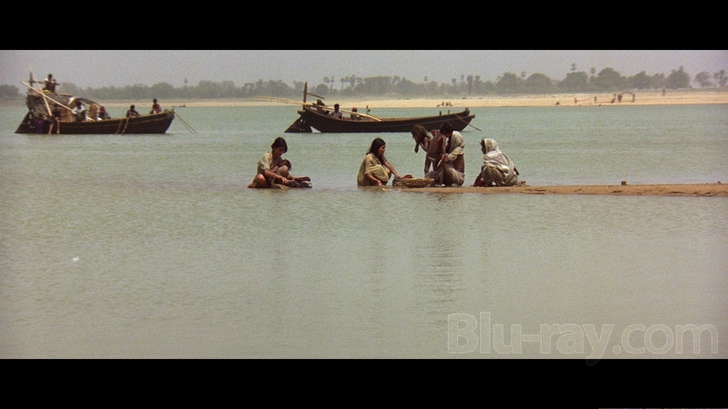
Gandhi's nine Academy Awards include Best Cinematography. Director of photography Billy Williams framed all the shots expertly, but there is a softness and gentle strobing throughout the Blu-ray, indicative of source material that has not aged well. The 2.35:1 presentation shows few signs of digital manipulation for an overall film-like experience that, despite the picture's softness and small grain, shows good detail and resolution. But after seeing many reference-quality BDs, it gets more difficult to be too excited about the level of definition in some of these classic catalog titles. Overall, the results are very impressive considering the source material.
Watch the scenes related to the Dharasana Saltworks protest, the preceding march by Gandhi to his hometown and the British officials discussing their response. As Gandhi sits by the sea with the New York Times reporter played by Martin Sheen, the plaid fabric of Sheen's cap shows excellent detail. The landscape appears to have depth not as convincing as a some BD transfers, but not poor either. Williams often allows backgrounds to go soft and follows moving people and objects so that focal points remain fixed while peripheral images blur. Unlike NTSC productions of Gandhi, crowd gatherings have good definition and each person appears distinct. This is demonstrated effectively at several points in the film, but at the seasalt demonstration on the beach, it is particularly noteworthy. The lines on the face of the British magistrate are also impressively resolved. At times, however, the increased resolution shows the problems the makeup team faced in trying to make some of the characters age decades. Hair and makeup show some flaws, which may be another reason Williams chose a softer look overall. And while Kingsley's acting is flawless, the camera reveals him to be in far better condition than anyone actually suffering weeks of fasting. Thankfully, the 1080p resolution reveals the hair and makeup job was more than adequate for Kingsley as he transforms himself into the character of Gandhi. As a whole, the visuals are above average, but unfortunately the picture does not rise near the level of reference quality.
Gandhi Blu-ray Movie, Audio Quality 
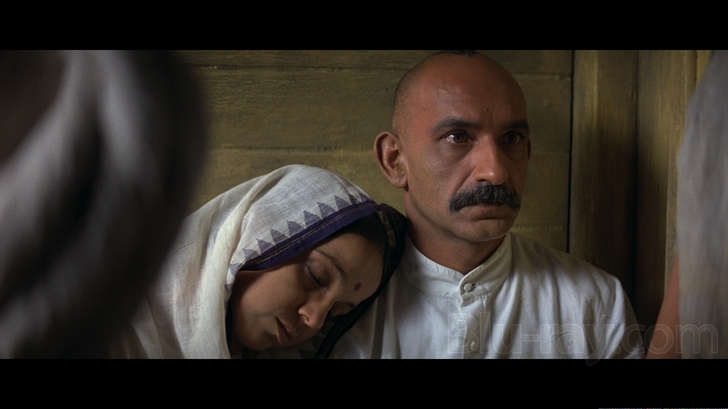
The audio also reveals limitations of the source material. While the music by Ravi Shankar and orchestral score by George Fenton sound clear and liquid in the midrange--and are anchored solidly across the front three speakers--the treble performance is somewhat lacking. The percussive attack of Ravi Shankar's sitar strings is missing, making for a more polite, less vivid presentation. But that is fairly normal for music recorded in the early 1980s. Unfortunately, the real problems with the audio track crop up frequently with more congested crowd noises, explosions and small arms fire that do not sound terribly convincing. The gunshots at the opening of the film--when the Mahatma is assassinated--sound boxed in and hollow rather than the open, percussive blasts common to more dynamic BD tracks. Voices tend to have this boxy quality too. They appear a bit rolled off and compressed, but maintain good clarity and vocal timbre. While Sony delivers a 5.1 Dolby TrueHD track, it makes virtually no use of the surrounds and includes little content for the LFE channel. At some points in the film, the congestion of sound from crowds or car engines actually breaks up into mild distortion, which is never nice to hear.
Whether you attribute the audio track's problems to the original recording engineers or the source material, the fact remains that it holds back the BD's performance. Listen to the crowd noises as the camera follows villagers walking along the border of India and Pakistan. As the two sides erupt in violence, the music and the cries of the crowd mesh into a congealed boxed-in, rolled-off train wreck. Speaking of which, the train noises are not convincing either. Listen to the locomotive as Gandhi uses the railways to rediscover his homeland. There is no breathy chug-chugging or clacking or whistle sound. It is subdued due to rolled-off highs that would grant the track the treble cues to make it more realistic. To put it in perspective, few fans of the film would find the audio prohibitive. It won't get in the way of the average person's enjoyment of the film, but you won't want to use Gandhi to show off the merits of your HT system.
Gandhi Blu-ray Movie, Special Features and Extras 
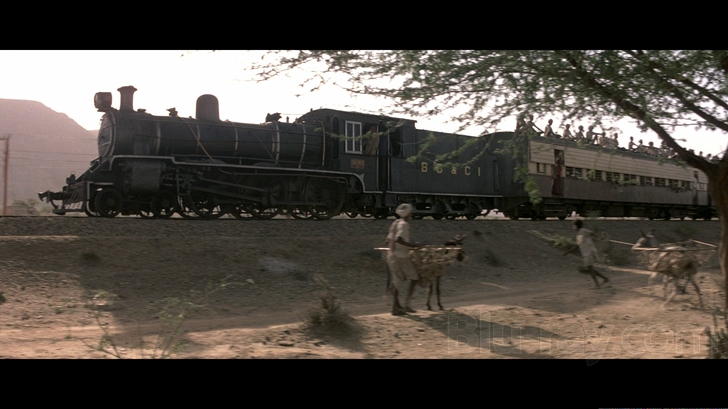
While the supplementary material in Sony's 25th anniversary edition of Gandhi cover pretty much everything you could want to know about the film, and include new content exclusive to the Blu-ray, the documentary featurette about the Mahatma himself is not sufficient. Even the main feature amounts to a rough sketch, and those viewers wishing to learn more about Gandhi will need to seek out his biography and writings documented by Louis Fischer among others. That said, the material about the film is fairly comprehensive, combining the best of the previously-produced featurettes on disc 2 with new supplementary content on disc 1.
Disc 1
Gandhi's Legacy: A Picture-in-Graphics Track--This introduction by Sir Richard Attenborough is a welcome addition to the Blu-ray, offering some high definition content from the producer/director.
Director's commentary--Attenborough's audio commentary is a fascinating log of the filming and work that went into the movie. It ranges from anecdotes to technical details about the production.
Disc 2
The following low resolution content was previously produced.
Vintage Newsreel Footage
Sir Ben Kingsley Talks about Gandhi
In Search of Gandhi
Reflections on Ben
Madeleine Slade: An Englishwoman Abroad
The Funeral
Looking Back
Shooting an Epic in India
Designing Gandhi
From the Director's Chair
The Words of Mahatma Gandhi
The Making of Gandhi Photo Montage
Gandhi Blu-ray Movie, Overall Score and Recommendation 
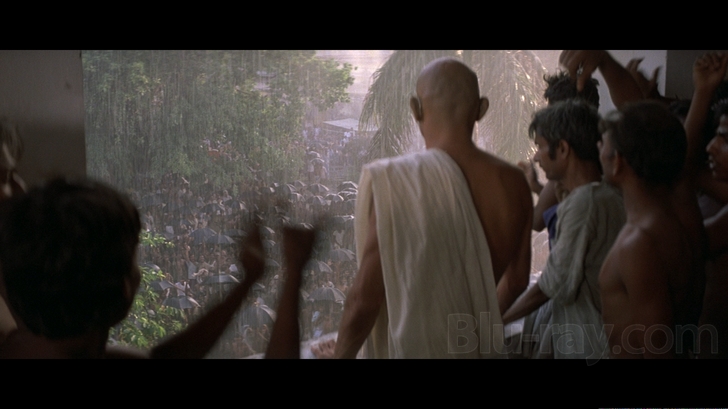
In revisiting Attenborough's Gandhi, the film's value, power, epic scope and visually stunning presentation were reaffirmed. The production values were exquisite. Kingsley was an especially strong choice for the lead role, as a mainstay in British theater prior to his breakthrough performance that made him an international celebrity. Born Krishna Bhanji, Kingsley was the son of a mixed marriage. His father, Rahimtulla Harji Bhanji, was a Muslim of Indian descent who immigrated to England as a boy. It seems evident that Kingsley identified with Gandhi on a personal level in a addition to the philosophical and spiritual level so many of us admire in the Mahatma, and this connection helped his award-winning character study.
In rewatching Gandhi, I was struck by the immense idealism that Gandhi not only conjured as potential energy but was able to transfer into kinetic energy to make the world a better place. I was also reminded of some of the pitfalls of idealism in the real world. During the second World War, when the Life reporter played by Candice Bergen asked Gandhi whether nonviolence should be applied always--even in dealing with Nazi Germany--Gandhi replied in the affirmative. While the philosophy of nonviolence seems noble, its implementation may not always be right. Indeed, had India emerged united from a violent revolution to overthrow British rule rather than winning independence on the shoulders of a spiritual man's ideals, the country may not have been divided into Pakistan. An India united in that manner may have been stronger, may not have had to fight three wars with Pakistan and constantly be on the receiving end of Islamic terrorism to the present day. But there is little point to questioning Gandhi's ideals. He was not an official statesman and his goal of nonviolence is beyond reproach.
Despite the minor problems with the video and audio, Gandhi is an essential film and the 1080p presentation makes it a must-have for your Blu-ray library.
Similar titles
Similar titles you might also like

Mandela: Long Walk to Freedom
2013

Cesar Chavez
2014

Lincoln
2012

John Adams
2008

The Last Emperor 4K
Theatrical (4K/BD) and Television (BD) Versions
1987

The Aviator
2004

Dallas Buyers Club
2013

The Iron Lady
2011

12 Years a Slave
2013

Schindler's List 4K
25th Anniversary Edition
1993

Winnie Mandela
2011

Malcolm X 4K
1992

The Last King of Scotland
2006

The Social Network
Collector's Edition
2010

A Man for All Seasons
1966

Abe Lincoln in Illinois
Warner Archive Collection
1940

Invictus
2009

The Bridge on the River Kwai
1957

J. Edgar
2011

Selma
2014

